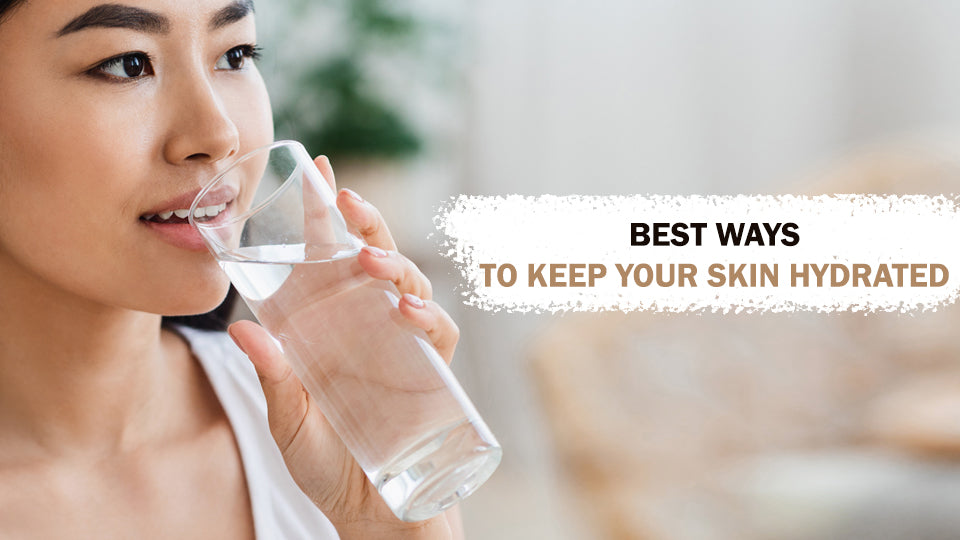Best Ways To Keep Your Skin Hydrated

We all probably know the importance of keeping our skin hydrated. It is indeed essential for the skin to look healthy and plump. Not only that, but if the skin isn't adequately hydrated, it paves the way for many skin problems. But, keeping your skin hydrated isn't possible just by caring for them for one or two days; instead, it requires routine skincare using skincare products that can deeply moisturize your skin and lock in moisture. Here are some effective ways that can help keep your skin hydrated. Let's dive into it;
Before moving on to the best ways to keep the skin hydrated, let's get to know what hydrated skin is;
What is Hydrated Skin?
The skin with ample water content is called hydrated skin. When your skin looks fresh, plump, soft and healthy, we call it- hydrated skin. Whereas, when your skin looks dull and rough, it means it is dehydrated. Ultimately, the main aim of hydrating the skin is to maintain its rich water content of the skin.
How To Keep the Skin Hydrated?
Here are some fool-proof ways to keep your skin hydrated;
Drink more water
When you increase the water intake, it provides more moisture to the skin. In addition, drinking more water helps flush out the body's toxins. Besides, the skin remains hydrated and plump. You might also include fruits and vegetables that are high water content, like watermelon, peaches, apples, cucumber, celery etc., in your diet to stay hydrated.
Stay away from dehydrating food and drinks:
Yes, certain foods and beverages can cause skin dehydration, and some of them are alcohol, excessive amounts of caffeine, processed foods, beverages with high sugar or sodium etc. If you want to keep your skin healthy and hydrated, it's time to replace these foods and drinks with healthier options.
Choose hydrating skin products:
Water-based skincare products help keep the skin hydrated. Some of the best hydrating ingredients to include in skincare are
- Hyaluronic acid: When we think about a hydrating ingredient, the first name that pops up in our mind is hyaluronic acid. In fact, it is one of the most recommended ingredients by dermatologists to include in skincare. Hyaluronic acid acts as a humectant to hydrate the skin's outer layer.
- Squalane: It gets absorbed quickly and has excellent emollient properties. It's a great moisturizer and helps prevent water loss from the skin.
- Ceramides: It's best in boosting hydration by locking in moisture. Ceramides also help improve the barrier function and are an important part of the stratum corneum- the outermost layer of the epidermis.
- Glycerin: Though we get different ingredients to keep the skin hydrated, glycerin is often in the limelight because it’s an ingredient used in almost all skincare products. It's a humectant that has the power to attract water to itself, and so when used on the skin, it helps draw water to the skin.
Avoid over-cleansing
Over-cleansing isn't good for the skin, as you're stripping off the natural moisturizing barrier of the skin. So, to keep your skin free of impurities and oil, you only need to wash your face twice daily- morning and night using a mild hydrating facial cleanser.
Use a moisturizer after cleansing
Do not dry your skin completely after using a cleanser; just pat dry it. When the skin is still damp, apply your moisturizer, preferably the one that contains skin hydrating ingredients like hyaluronic acid and Squalane.
Use a facial serum
If you haven't invested in a serum, maybe you should think about it sooner if your skin needs more hydration. Because serums are highly concentrated and penetrate quickly onto the skin, not all facial serums are hydrating, so choosing a hydrating facial serum, preferably the one that contains hyaluronic acid, will be a wiser option.
Do not forget sunscreen
It's a known fact that when the skin is exposed to ultraviolet rays, it leads to skin damage. Not only that, but the harsh UV rays can also affect the skin's water-holding capacity, thereby making the skin dehydrated. So, using sunscreen on the skin not only protects the skin against UV rays but also helps maintain hydration of the skin.
Avoid hot and long showers
There is always a misconception that hot showers can help dehydrated skin, but it is the other way around. Taking a bath in hot showers strips the skin's natural moisture, making them feel dry. And so, it's good to go for a short shower using lukewarm water. Similarly, do not forget to apply your daily moisturizer post-shower.
Use a humidifier:
Humidifiers are much needed in winter because the dry air can make your skin feel dry. That's where a good humidifier can help you; it helps increase the moisture content of the air, which in turn helps the skin maintain hydration.
We all dream of healthy and hydrated skin, but to achieve them, you need to make a little effort. However, keeping the skin hydrated is not a choice; instead a requirement for healthy skin.